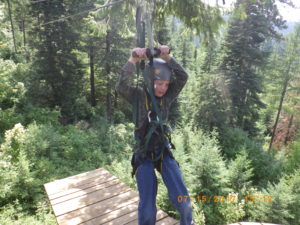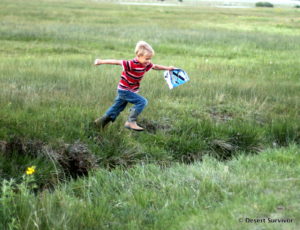 I took a play day yesterday and conned the eldest grandson, Jeffrey, into going on a zipline adventure by telling him it "would be fun, dude!"
My daughter could have warned him that my idea of fun spans a range of activities a mite more exciting than tiddlywinks. She didn't. I think she figures that three girls survived me as a dad talking them into crazy things, so the grandson would survive, too. Probably.
I took a play day yesterday and conned the eldest grandson, Jeffrey, into going on a zipline adventure by telling him it "would be fun, dude!"
My daughter could have warned him that my idea of fun spans a range of activities a mite more exciting than tiddlywinks. She didn't. I think she figures that three girls survived me as a dad talking them into crazy things, so the grandson would survive, too. Probably.
This little jaunt was planned back in January over a glass of wine. Last year, everything aligned to treat my daughters and eldest two granddaughters to a series of concerts - Pentatonix, The Piano Guys, and Lindsey Stirling.
It was time to do something fun with Jeffrey and this struck my fancy as a grand way to treat Jeffrey to a memory that would stick for awhile.
Timberline Adventures in Couer d'Alene runs the excursion. They do it well. The check-in process - yes, they will make you sign a waiver - was smooth as silk. Then, they weigh you. This part had me a little worried as the weight minimum to zip alone is 80 pounds. Jeffrey, like most of the grand-kids, does a fair impression of a beanpole. He didn't make weight which meant that he'd have to zip in tandem with someone else. Not me, though. Our combined weight blew right past the upper limit to 270 pounds.
Our guides for the trip, Ali (Big Al) and Taylor, set us up in harnesses and helmets and covered the ground rules. Mostly, listen to them and don't be stupid stuff. Then we left, eight of us, all newbie zippers. in a van to a chunk of private property with seven ziplines, a couple of bridges, and a very cool tree house under construction. 
Jeffrey got a little more wide-eyed the closer to the top of the mountain we got. Pretty sure he was reconsidering the wisdom of hanging with Papa. Still, the kid is a trooper and stuck to it. We hit the first zip, a short little bunny of a line according to Ali. I asked Jeffrey when he wanted to go.
"Last." Sensible. Let all the big people go first. Just in case . . .
Taylor, who is not a big person in stature but oozes personality, zipped over first. The system that Timberline established makes eminent sense. One guide heads over first. That one handles the brake on the line that they use to keep the rest of us under control when we get to the next platform.
One at a time, Ali clipped us into the safety lines, then transferred the rollers to the zip line, then locked us in. She and Taylor maintained radio contact. No one zipped until it was cleared on both ends. Ali, too, oozed personality, but not the showmanship ham of Taylor. She was quieter and funny and kept all of us on an even keel.
Down the line they went, the family of four, the couple from Spokane, and then, my turn. As with most things in life, I'm too tall. Ali's directions - "Step off the top platform and go." My result? I could walk to the next step down. And the next. Then, I could go. And did.
Zipping on a steel cable sixty feet from the ground is a rush. You can steer your body to face whatever direction you like by shifting weight and arm movements. It took about three seconds to realize just how good Taylor and Ali's balance must be to have the level of control that they maintain.
I hit the next platform in good order - surprise! - and waited. The folks back at the storefront mentioned that Jeffrey might be able to do some of the early zips by himself. The longer ones would be in tandem. I hadn't thought it through, but watching some of the lighter people gliding in on the longer lines, the physics kicked in. The lighter bodies didn't have as much momentum to over come the friction loss as they  came up to the landing platforms. More on that later . . .
came up to the landing platforms. More on that later . . .
. . . because here came Jeffrey like a rock star. zipping on his own. He'd done the first zip solo. He was easily the youngest in the group by a decade. The others couldn't have been more supportive. If this was a representative group, then zippers, experienced and the newbies, are incredibly pleasant people to spend an afternoon with. Jeffrey did seem relieved to actually slide into a landing.
Each zip built on the last one. There are seven total with the first four acting as the training lines and the last three exhilarating. Jeffrey only did the first zip solo. The second he did with Ali. After I had made my way down, they had a conversation. I wasn't privy to the details but, given how slowly Jeffrey had hit the end of the first run, I think Ali was concerned that he might get stuck in the middle.
Ali took absolutely terrific care of Jeffrey. He zipped in tandem with her for the rest of the lines, though he walked the bridges solo. She talked to him like a buddy and had him smiling and enjoying himself.
The rest of us had fun. One of the young ladies had more faith in the safety harness than I did and leaned into space from the platform, imitating Taylor. She laughed when I mentioned that I spend my days minimizing my risk of falling. Ali, when we first geared up, asked if I was afraid of heights. I'm not. It's falling that gets to me, so I don't do it.
Both Ali and Taylor kept up a steady stream of conversation, but their attention to detail was impressive. The training that Timberline does must be effective. At no point while we were tree-bound was a guest not hooked to at least one safety line and usually two. When the two of them transferred safeties, they moved precisely to snap each carabiner in proper sequence. (We had been previously warned not to mess with them ourselves. I declined to mention that I had already figured o ut the catches. In my defense, it was at the storefront. Once in the trees, I behaved.)
ut the catches. In my defense, it was at the storefront. Once in the trees, I behaved.)
Midway through, we took a short break from Line 4 while the group ahead of us cleared. Taylor told us to follow him, and we made a short jaunt through the forest to a very cool tree house that Timberline is building. Since you can't show me a house without my inspector instincts kicking in, I was checking out the glulams and inverted trusses. It is a neat piece of engineering. Next time I go, hopefully it will be open. The views of Lake Couer d'Alene alone will be spectacular.
 To get to the launching pad for Line 5, you need to cross a bridge. The bridges swayed and bucked more than the lines did. Even here, they keep the guests tethered. The safety protocols were impressive.
To get to the launching pad for Line 5, you need to cross a bridge. The bridges swayed and bucked more than the lines did. Even here, they keep the guests tethered. The safety protocols were impressive.
The last three lines got progressively longer and faster. The last one was 1600 feet long. Taylor reminded us that over-steering slowed the descent and to be careful not to strand ourselves out in the middle. Each one of the lines has sag built into it, a thought that hadn't occurerd to me, but make eminent good sense. If the run was tight and downhill, the arresting mechanism would be the tree. Ouch.
So, instead the line sags. You accelerate down it and then, at the bottom of the arc, begin to slow. The slack and drop height between the anchors is set up so there is more acceleration time than the reverse otherwise the friction would leave everybody hanging around looking for a hand.
On the last long line, it dawned on me that you should be able to optimize speed (cannonball maybe, or an upside Superman position - Taylor would know) and flare out at the last minute and use air resistance to slow down.
If your mental picture just included a body going splat! into the tree trunk and was accompanied by the theme music to George of the Jungle, welcome to the club. I wasn't trying it on my first time zipping.
Maybe next time. Jeffrey is already game to try it again and, with a host of grandkids getting bigger, we might even talk a couple of others into. In the meantime, if you find yourself in the Spokane/Couer d'Alene area with a summer afternoon to spare, might I suggest giving Timberline Adventures a try?
As I said, it's rush.












